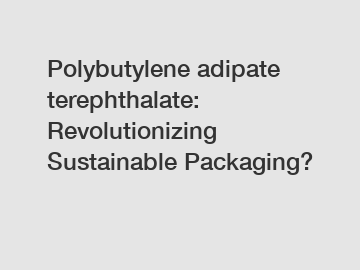Polybutylene adipate terephthalate: Revolutionizing Sustainable Packaging?
Polybutylene adipate terephthalate (PBAT) is revolutionizing the sustainable packaging industry. With its unique properties and environmental benefits, PBAT has emerged as a game-changer in the quest for eco-friendly packaging solutions.
PBAT, a biodegradable polymer, is derived from adipic acid, terephthalic acid, and a biobased alcohol called 1,4-butanediol. It offers a viable alternative to traditional packaging materials like polyethylene and polypropylene, which are non-biodegradable and contribute to the growing problem of plastic waste in our environment.
The revolution of sustainable packaging began as concerns about the environmental impact of plastic waste grew. Traditional plastic packaging materials take hundreds of years to decompose, leading to landfill overcrowding and pollution of ecosystems. With PBAT, packaging materials can be broken down by microorganisms in a relatively short period, reducing the environmental burden associated with plastic waste.

The biodegradability of PBAT can be attributed to its molecular structure. The adipate and terephthalate components of PBAT enhance its flexibility and durability, making it an ideal choice for various packaging applications. Moreover, PBAT is compatible with other biodegradable polymers, allowing for the creation of composite materials that further enhance its strength and biodegradability.
The environmental benefits of PBAT extend beyond its biodegradability. Its production requires less energy and resources compared to traditional plastic materials. Furthermore, the use of PBAT reduces the dependence on fossil-fuel-based plastics, contributing to the overall reduction of carbon emissions.
The impact of PBAT on the packaging industry is significant. Its biodegradability and compatibility with other bioplastics have opened up new possibilities for designing sustainable packaging solutions. From food packaging to personal care products, PBAT can be utilized in a wide range of applications without compromising product integrity.
In terms of regulatory support, governments and organizations around the world are recognizing the importance of sustainable packaging and are implementing measures to encourage its adoption. The demand for environmentally friendly packaging materials is growing, prompting manufacturers to explore innovative solutions like PBAT.
However, it is important to note that PBAT is not a standalone solution to the plastic waste problem. Collaboration between various stakeholders, including packaging manufacturers, waste management systems, and consumers, is essential for the successful integration of PBAT into the mainstream packaging industry.
In conclusion, Polybutylene adipate terephthalate (PBAT) is revolutionizing sustainable packaging with its biodegradability, compatibility, and reduced environmental impact. Its unique properties offer a viable alternative to non-biodegradable plastics, addressing the global challenge of plastic waste. With the support of regulations and collective efforts, PBAT has the potential to transform the packaging industry towards a more sustainable future.
Contact us to discuss your requirements of biodegradable resin manufacturers, biodegradable resin manufacturers, biodegradable resin. Our experienced sales team can help you identify the options that best suit your needs.


